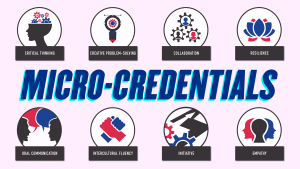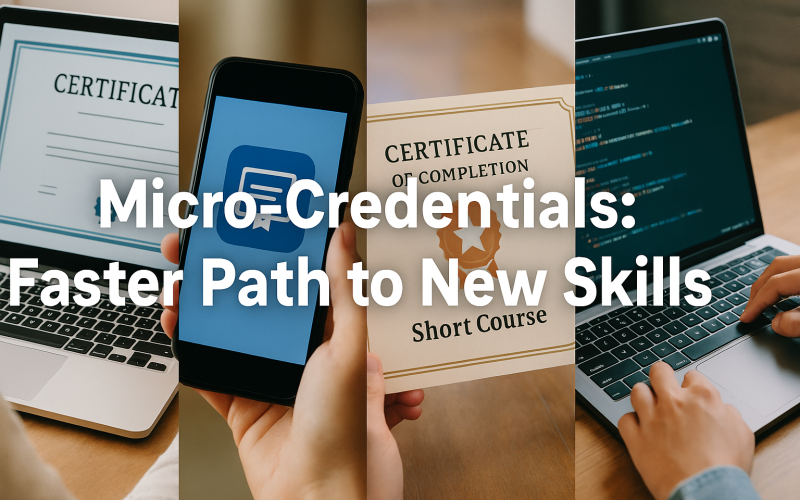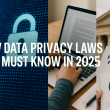Introduction
You no longer need years in a lecture hall—or a hefty tuition bill—to prove you can do the job. Thanks to micro-credentials, short online programs that teach specific abilities, learners are jumping into new careers in months, not years. These brief certificates, delivered by universities and tech firms alike, are reshaping education and employment worldwide. As job requirements shift at lightning speed, workers and employers alike are looking for flexible, low-cost ways to stay ahead. Micro-credentials meet that need.
What Are Micro-Credentials?
Micro-credentials are focused, bite-sized learning units that certify a single skill or cluster of skills. Unlike a full degree, they target precisely what an employer wants—no filler classes. Learners finish a short online course (often under 12 weeks), complete practical assessments, and earn a digital badge for skills that lives on their résumé or LinkedIn profile. Providers range from traditional universities issuing “MicroMasters” to coding bootcamps and global MOOC platforms.
How They Work
Most courses are self-paced videos, quizzes, and projects delivered entirely online. After passing, you receive a verifiable badge stored on a blockchain or learning record. Employers can click the badge to see what you actually mastered—say, Python data analysis or cloud security. Some credentials are stackable: complete several and you can convert them into university credit for a larger certificate or even a degree.
Why Are Micro-Credentials Booming?

Research firm HolonIQ predicted the online degree and micro-credential market would hit $117 billion by 2025, up $20 billion from earlier forecasts. A May 2025 Coursera report showed 90 percent of employers now offer higher starting salaries—usually 10–15 percent—for candidates holding these mini-certificates.
Employer Demand
Companies everywhere struggle to fill roles in AI, cybersecurity, and clean energy. Micro-credentials give hiring managers proof of competence without waiting for four-year graduates.
Learner Motivation
With tuition rising and technology evolving fast, professionals want rapid upskilling pathways they can complete alongside full-time work. Micro-credentials cost a fraction of a semester and fit into evenings or weekends.
Platform Explosion
MOOC giants like edX (86 million learners) and Coursera (82 million) dominate, but smaller niche sites now tailor content to healthcare, construction, and even game design.
Why Micro-Credentials Are Surging in 2025
Skills Half-Life Is Shrinking
Deloitte estimates technical skills expire within 2.5 years on average. Quick upskilling beats multi-year programs that risk obsolescence upon graduation.
Talent Gap Pressures
Cybersecurity unfilled job postings passed 3.4 million globally. Employers now hire candidates with CompTIA Security+ or Google Cybersecurity Certificates, then train further on the job.
Remote Learning Normalized
Pandemic-era e-learning tools matured. Self-paced video, cohort-based live sessions, and VR labs make micro-credentials accessible worldwide.
Digital Verification Tech
Open Badges 3.0 and blockchain registries let recruiters verify credentials in seconds, slashing fraud.
Types of Micro-Credentials
Micro-credentials vary by provider, depth, and industry recognition. Below are common types.
Digital Badges
Digital badges are visual icons that represent a verified skill. Issued via online platforms, they link to metadata about the issuing organization, criteria, and evidence. Learners can display badges on LinkedIn, personal websites, and digital portfolios.
Professional Certificates
Offered by universities and tech companies, professional certificates involve multiple modules and often include assessments or capstone projects. Examples include Google’s Professional Data Engineer Certificate and IBM’s Applied AI Certificate. These credentials carry weight in specific industries.
Industry-Recognized Credentials
Organizations like CompTIA (IT certifications), PMI (Project Management Professional), and Adobe (Adobe Certified Expert) issue well-known credentials. While not strictly “micro,” many of these certifications focus on specific skill sets and can be completed quickly.
Snapshot: Leading Platforms in 2025
| Platform | Learners (Millions) | Notable Credential Type |
|---|---|---|
| edX | 86 | MicroMasters |
| Coursera | 82 | Professional Certificate |
| LinkedIn Learning | 27 | Skill Badge |
| Udacity | 14 | Nanodegree |
| FutureLearn | 12 | Microcredential |
Data compiled from edX, Coursera, and Class Central platform statistics.
Benefits for Learners

First, micro-credentials are affordable—many start under $300, and some offer need-based grants. Second, the learning is laser-focused, trimming months of theory you may never use. Third, badges arrive quickly, boosting confidence and opening interview doors sooner. Finally, because courses are online, learners worldwide gain access to elite faculty without visas or relocation.
Benefits for Employers
Hiring managers care less about where you studied and more about what you can do today. A verified industry-recognized badge reduces guesswork in screening. Teams also save training budgets: new hires hit productivity targets faster. Companies can even partner with providers to craft custom stacks that match internal tech stacks.
Role in Skills-Based Hiring
Nine in ten employers now rely on skills tests, portfolios, and micro-credentials rather than degrees alone. Governments also encourage this shift; several U.S. states offer grants to workers earning occupation-aligned badges, part of a broader push toward skills-based hiring.
Case Example
A Midwest manufacturer needed robotics technicians. It teamed up with a community college to create a 10-week micro-credential in industrial automation. Graduates earned $4 per hour more than peers without the badge and filled vacant roles in half the usual time.
Challenges and Considerations

Despite hype, not all badges hold equal weight. Some platforms lack rigorous assessment, leaving employers uncertain about quality. Accreditation is still patchy, and credit transfer rules vary by institution. Learners must vet providers, confirm employer recognition, and maintain badges with periodic updates as tools evolve.
Equity Issues
Low-income workers still face barriers such as limited broadband and unpaid study time. Policymakers and companies can help by offering stipends, loan-free grants, and flexible work hours.
Future Outlook
Experts expect stackable credentials to blend seamlessly with degree paths. Universities may offer a “pick-and-mix” system where learners build a custom Bachelor’s over several years, stacking micro-courses from different schools. The World Economic Forum predicts 44 percent of worker skills will change by 2030, so continuous learning will be the norm. Micro-credentials fit perfectly into that future.
Tips for Choosing the Right Program
- Check employer partnerships—does the provider list hiring partners?
- Compare syllabi against official job ads; the closer the match, the better.
- Look for transparent assessment methods such as graded projects reviewed by experts.
- Confirm whether the badge is stackable for future credit.
- Plan study time realistically; even short programs demand focus.
Conclusion
Micro-credentials are no fad. They are a practical response to the fast pace of modern work. These short, focused courses offer learners a quicker, cost-effective gateway to new careers while supplying employers with confident, job-ready talent. As long as providers maintain quality standards and widen access, micro-credentials will remain a powerful tool for lifelong learning and economic growth.
Call to Action
Ready to jump-start your next skill? Explore reputable platforms like edX or Coursera today, pick a micro-credential that aligns with your career goals, and start learning this week. The sooner you earn that badge, the sooner you can impress employers and unlock new opportunities—so take your next step now!












